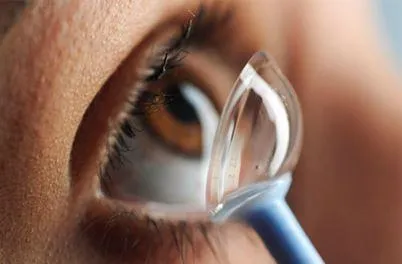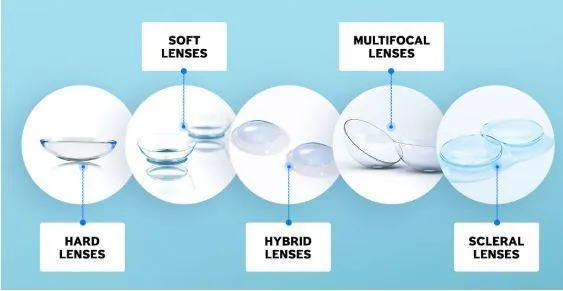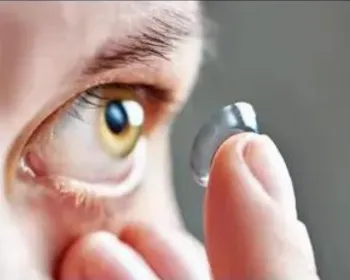Kleinwood Vision
Specialty Contact Lens
Fittings
FSDAVCFEBFEVSDDVFSD
FSDAVCFEBFEVSDDVFSD
FSDAVCFEBFEVSDDVFSD
We are the #1 Local Provider of Specialty Contact Lenses
At Kleinwood Vision in Houston, we understand that no two eyes are alike—especially when dealing with vision issues like keratoconus,
astigmatism, or extremely high prescriptions. That’s why our specialty contact lens fittings are designed around the specific needs of each patient, providing clear vision through personalized solutions.
Our office uses advanced diagnostic technology to conduct thorough eye assessments and precise measurements. This allows us to custom design lenses that not only correct your vision accurately but also fit comfortably, even in complex cases.

At Kleinwood Vision in Houston, we understand that no two eyes are alike—especially when dealing with vision issues like keratoconus, astigmatism, or extremely high prescriptions. That’s why our specialty contact
lens fittings are designed around the specific needs of each patient, providing clear vision through personalized solutions.

For patients with keratoconus, we often recommend scleral lenses that provide sharp vision and comfort by arching over the cornea instead of sitting directly on it. People with significant astigmatism may benefit from toric contact lens fittings, which are tailored to correct irregular curvature in the cornea.
At Kleinwood Vision, we strive to meet each patient’s unique visual needs. Our team relies on modern technology and attentive care to offer specialty lenses that improve both your vision and your day-to-day life.
Our office uses advanced diagnostic technology to conduct thorough eye assessments and precise measurements. This allows us to custom design lenses that not only correct your vision accurately but also fit
comfortably, even in complex cases.
For patients with keratoconus, we often recommend scleral lenses that provide sharp vision and comfort by arching over the cornea instead of sitting directly on it. People with significant astigmatism may benefit from toric contact lens fittings, which are tailored to correct irregular curvature in the cornea.
At Kleinwood Vision, we strive to meet each patient’s unique visual needs. Our team relies on modern technology and attentive care to offer specialty lenses that improve both your vision and your day-to-day life.
Different Types of Specialty Contact Lenses

At Kleinwood Vision, we specialize in fitting a wide selection of specialty contact lenses tailored to individuals with complex vision issues or uncommon eye shapes. These advanced lenses are chosen based on what best supports your eye health, lifestyle, and clarity of vision.
Rigid Gas Permeable (RGP) Lenses: Crafted from a firm, oxygen-permeable material, RGP lenses retain their shape on the eye, delivering precise and stable vision correction. They’re especially effective for people with strong prescriptions or astigmatism and are appreciated for their durability and long-term performance.
At Kleinwood Vision, we specialize in fitting a wide selection of specialty contact lenses tailored to individuals with complex vision issues or uncommon eye shapes. These advanced lenses are chosen based on what best supports your eye health, lifestyle, and clarity of vision.
Rigid Gas Permeable (RGP) Lenses: Crafted from a firm, oxygen-permeable material, RGP lenses retain their shape on the eye, delivering precise and stable vision correction. They’re especially effective for people with strong prescriptions or astigmatism and are appreciated for their durability and long-term performance.

Scleral Lenses: Designed to vault over the cornea and rest on the sclera (the white of the eye), scleral lenses create a fluid reservoir that helps hydrate the eye while offering clear, consistent vision. This makes them an ideal choice for patients with dry eye syndrome, irregular corneas, or conditions like keratoconus that impact corneal shape.
Hybrid Lenses: Combining a rigid center with a soft outer skirt, hybrid lenses deliver sharp visual correction with enhanced comfort. They’re a popular alternative for those who want the visual precision of gas permeable lenses without sacrificing the flexibility and feel of soft contacts.
Orthokeratology (Ortho-K) Lenses: These custom-fitted lenses are worn while you sleep, gently reshaping the cornea overnight to temporarily correct nearsightedness. By morning, most users can enjoy clear, glasses-free vision all day. Ortho-K is a great solution for those who want non-surgical vision correction or are not ready for LASIK.
Frequently Asked Questions
Frequently Asked Questions
What are specialty contact lenses?
Specialty contact lenses are custom-designed lenses made to correct vision in patients with unique eye shapes or conditions, such as keratoconus, astigmatism, or severe dry eyes. These lenses provide clearer vision and more comfort compared to standard lenses.
Who should consider specialty contact lenses?
If you have a condition like keratoconus, high astigmatism, or irregular corneas, specialty lenses may be a good fit. They are also ideal for people who struggle to find comfort with traditional contacts or glasses.
What types of specialty lenses are available?
There are several types of specialty lenses, including Rigid Gas Permeable (RGP), scleral, hybrid, and orthokeratology (Ortho-K) lenses. The type you need depends on your specific eye condition and visual requirements.
How do scleral lenses work?
Scleral lenses cover the cornea and rest on the sclera, the white part of the eye. They create a tear-filled vault over the cornea, which helps improve comfort and vision stability, especially for people with conditions like keratoconus.
What conditions do scleral lenses help treat?
Scleral lenses are effective for treating keratoconus, irregular corneas, dry eyes, and other conditions that make traditional contact lenses uncomfortable or ineffective.
Are specialty lenses comfortable??
Yes, specialty lenses are designed for comfort. For instance, scleral lenses create a tear reservoir over the cornea, and hybrid lenses combine the comfort of soft lenses with the visual clarity of rigid lenses.
How is the fitting process for specialty lenses conducted?
The fitting process includes a comprehensive eye exam, corneal topography, and precise measurements. Based on these results, the best lens type is selected and customized to your eye shape.
What should I expect during a specialty lens fitting appointment?
Expect a thorough eye exam and measurements, followed by the trial fitting of your lenses. You’ll be guided through the process, and adjustments will be made as necessary to ensure the best fit and comfort.
Can specialty contact lenses improve vision?
Yes, specialty contact lenses can dramatically improve vision, especially for those with irregular corneas or conditions like keratoconus or high astigmatism. They are designed to provide clearer, more stable vision than standard lenses.
Are there follow-up visits after getting specialty lenses?
Yes, follow-up appointments are essential to ensure the lenses continue to fit well and function as intended. Adjustments may be made to optimize comfort and vision.
The Lens Fitting Process at Kleinwood Vision
Our specialty lens fittings begin with a complete eye exam to evaluate your vision and screen for any conditions that could impact lens choice, such as keratoconus or advanced astigmatism. We take time to understand your needs to determine the most effective lens type.
A key step in the process is corneal topography, which creates a precise map of your cornea’s shape. This imaging helps us understand the subtle variations in curvature and elevation that are essential for a proper lens fit.
Using this corneal map, we design lenses tailored to your exact eye shape. Depending on your condition, we may recommend rigid gas permeable, scleral, or hybrid lenses. For instance, scleral lenses work well for patients with uneven corneas because they sit on the sclera and don't touch the sensitive corneal surface.
We make sure the lenses provide clear vision while also maintaining healthy oxygen flow to your eyes. After the initial fitting, patients wear their lenses for a short trial period, followed by checkups to adjust the fit or prescription as needed.
This careful process allows us to deliver high-quality specialty contact lens fittings that address each patient’s vision needs while supporting long-term eye health.
Benefits and Care for Specialty Contact Lenses
Specialty contact lenses offer meaningful benefits for people who struggle with conventional lenses. Gas permeable lenses are a smart choice for keratoconus or high astigmatism, providing sharper vision and lasting durability. They also allow more oxygen to reach the cornea, which helps reduce the risk of irritation and infection.
Scleral lenses are especially helpful for people with severe dry eyes or irregular corneas. By creating a protective layer of moisture between the eye and the lens, they provide greater comfort and clarity throughout the day. These lenses can be life-changing for patients with complex eye issues.

Specialty contact lenses offer meaningful benefits for people who struggle with conventional lenses. Gas permeable lenses are a smart choice for keratoconus or high astigmatism, providing sharper vision and lasting durability. They also allow more oxygen to reach the cornea, which helps reduce the risk of irritation and infection.
Scleral lenses are especially helpful for people with severe dry eyes or irregular corneas. By creating a protective layer of moisture between the eye and the lens, they provide greater comfort and clarity throughout the day. These lenses can be life-changing for patients with complex eye issues.

To get the most out of your specialty lenses, proper care is essential. Clean and disinfect your lenses daily using only products recommended by your eye doctor. Never rinse lenses with tap water, and always wash your hands before handling them to prevent infection.
Routine checkups are just as important. Regular follow-up appointments help confirm that the lenses still fit correctly and are providing the right level of vision correction. These visits also allow your eye doctor to catch any potential problems early and make timely adjustments for yourcomfort and safety.

Contact Info
Hours of Operation
Mon - Fri | 9:00 AM - 5:00 PM
Sat - Sun | Closed
Holiday Hours: We are closed for the following holidays: New Years Day, Memorial Day, Independence Day, Labor Day, Thanksgiving Day, Christmas Day
© 2026 Kleinwood Vision. All rights Reserved.


